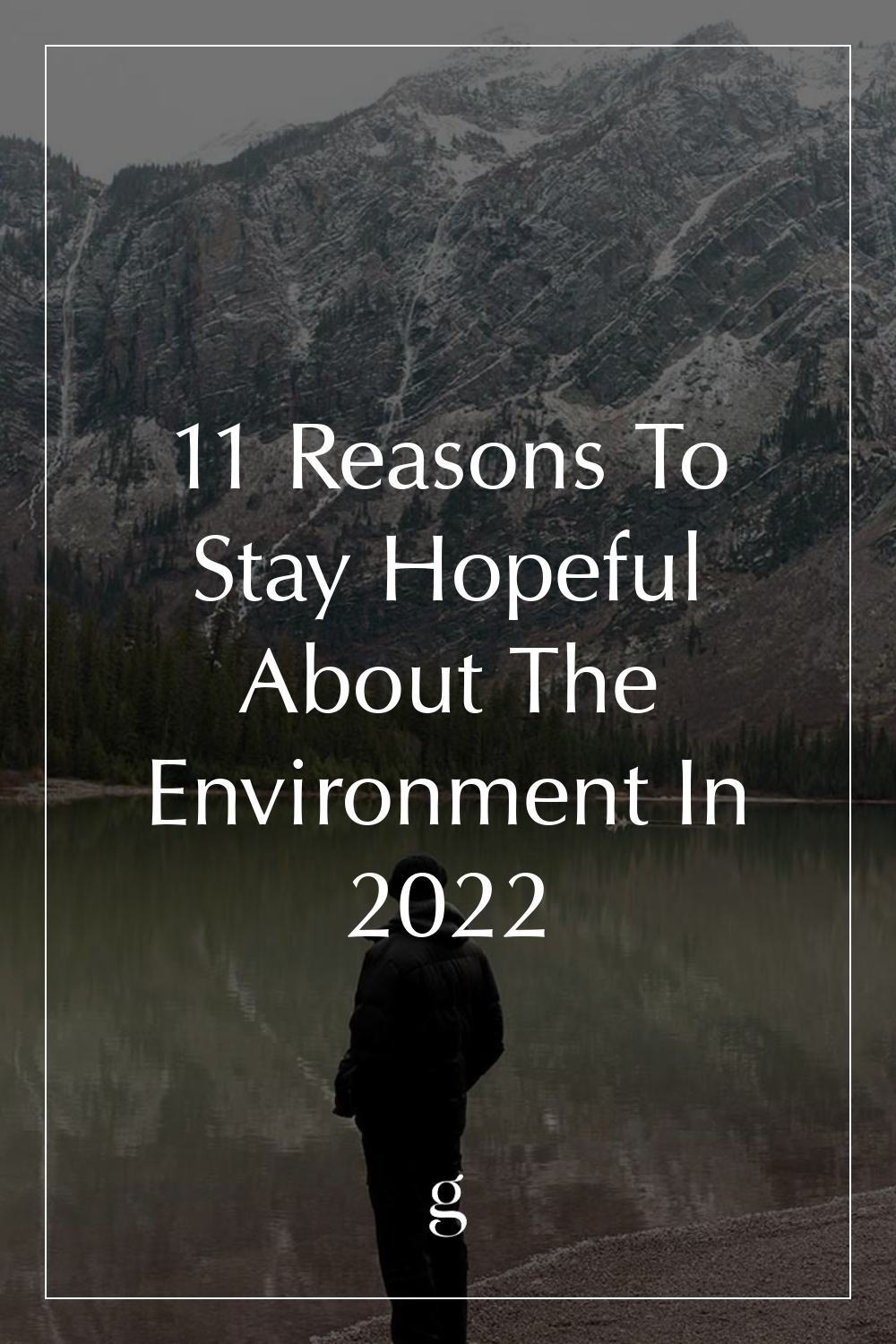
11 Reasons To Stay Hopeful About The Environment In 2022
Trends That Inspire Optimism About Our Planet’s Future
In early 2021, I found myself falling into a pit of doom and despair brought upon by the constant influx of bad news about our planet. Pair that with a side of general distrust for the very institutions that are supposed to protect both the planet and its people, the pit soon became all-encompassing, negatively affecting my work and research as a climate activist.
When I communicated this personal struggle to people on my Instagram, I learned that I was far from alone. So many other climate activists were experiencing burnout too, and many others expressed their reservations about joining the climate activism movement for this very reason.
“I needed to believe that change was possible, to exist as both a climate activist and climate optimist.”
But after letting myself sit with these feelings, I realized I needed to change my mindset if I wanted to continue the work that I knew to be so necessary for the planet. To make a change, I needed to believe that change was possible, to exist as both a climate activist and climate optimist.
Encouraged by my friend Kathryn Kellogg, founder of the Good News Friday segment, I began to search for the good. After almost a year of sharing Weekly Earth Wins on my Instagram, I have picked up on positive trends that we can look at to stay hopeful about the environment in 2022. Here are just 11 of those trends to help you remain optimistic about our planet’s future.
11 Reasons For Climate Optimism in 2022
1. More people than ever are (finally) concerned about climate change.
More Americans than ever before are concerned about the climate crisis and its current and projected consequences. More specifically, 59 percent of Americans said the Earth’s warming is very or extremely important to them as an issue, up from 49 percent in 2018.
2. Indigenous sovereignty is (finally) getting attention.
“2021 saw many wins for Indigenous communities across the planet.”
The movement for Indigenous sovereignty has gotten some of the long-overdue attention it deserves. Whether in the form of getting land back or government bodies beginning to understand the value of Indigenous land management, 2021 saw many wins for Indigenous communities across the planet.
In Australia, nearly 400,000 acres of land was returned to the Eastern Kuku Yalanji people, and in California, 1,199 acres of redwood forest and prairie were transferred to the Esselen tribe.
3. Intersectional Environmentalism education is on the rise.
More people around the world have been introduced to the relationships between various systems of oppression and climate change. The Intersectional Environmentalist pledge, which lays out the commitments to stand in solidarity with marginalized communities in the climate crisis fight and acknowledge the intersections between environmentalism and social justice, has been shared by over one million people in just a year and a half.
4. Large institutions are divesting financial holdings in extractive industries.
“As of publish, around 1,497 institutions have similarly divested from fossil fuels, adding up to a $14.6 trillion value.”
Thanks to increasing pressure from citizens, large institutions are divesting financial holdings in extractive industries. The richest university in the world—Harvard University—announced its commitment to divest all current financial holdings in the oil and gas industries earlier this year.
Other powerful institutions/bodies that made the same commitments include the University of Oxford, the Ford Foundation, NYC Pensions, the state of Maine, Boston University, and the University of Minnesota. The Divestment Database estimates that, as of publish, around 1,497 institutions have similarly divested from fossil fuels, adding up to a $14.6 trillion value.
5. Electric vehicles are on the rise.
Policies promoting the electrification of vehicles have spread on a federal and state-wide basis, including clean car programs, infrastructure development, and financial incentives. These policies and incentive programs are significant. They create opportunities for green jobs and will help chip away at the massive contribution cars have towards global greenhouse gas emissions (nearly 20 percent of all greenhouse gas emissions in the United States come from cars and trucks).
6. Customers are using their purchasing power.
“Now more than ever, customers are using their purchasing power to drive industry-wide sustainability changes.”
Now more than ever, customers are using their purchasing power to drive industry-wide sustainability changes.
A study published by Accenture revealed that 67 percent of consumers reported making more environmentally friendly and ethical purchases since the beginning of the pandemic.
7. Faith leaders are coming together and advocating for change.
Faith leaders from every major religion have acknowledged the reality of the climate crisis.
Nearly 40 leaders from various faiths signed a joint appeal in October of 2021, recognizing the relationship between morals central to faith communities and the responsibility to take care of the planet and its people. These leaders—part of interfaith groups like Faith Leaders for Environmental Justice and GreenFaith—are standing together to urge government officials and members of their congregations to take necessary action.
8. Environmental justice is being acknowledged on world stages.
“Environmental justice was acknowledged for the first time in history during a U.S. Presidential debate in 2020.”
Environmental justice was acknowledged for the first time in history during a U.S. Presidential debate in 2020 and has since been a concept circulated more widely on both the federal and state levels.
The Head of the Environmental Protection Agency, Michael Regan, has established environmental justice as a top priority of the agency and has a strong track record of promoting environmental justice as Secretary of the North Carolina Department of Environmental Quality.
9. Anti-plastic legislation is on the rise throughout the world.
Grocery stores are finally realizing that there is indeed no reason for oranges to be wrapped in plastic. In fact, more than 90 countries have established (or have imminent plans to establish) bans or fees on single-use plastic bags and other plastic products.
10. Renewable energy is becoming more affordable and widespread.
Wind and solar plants have become 70 percent and 89 percent cheaper, respectively, in the last decade. In addition, renewable energy sources were the only types of energy sources for which demand increased during the pandemic.
11. Global leaders are coming together and making pledges.
Governments that have long been at odds with one another are coming together for the betterment of the planet. At COP26, the U.S. and China—which together account for around 38 percent of the world’s annual carbon footprint—signed a joint pledge called “Enhancing Climate Action in the 2020s”.
Though the pledge makes vague targets without many tangible action items, it marks the first time China acknowledges the need to cut down on methane emissions, sets a goal for the methane emissions drawdown, and symbolizes urgency on behalf of both countries to act within this decade.
“As environmentalists, it is important that we remind ourselves of successes in the movement to inspire us and carry us forward.”
There is so much value in looking for the good in a world where bad news seems interchangeable for news. As environmentalists, it is important that we remind ourselves of successes in the movement to inspire us and carry us forward. For weekly updates on environmental wins throughout 2022, sign-up for this free newsletter.
Zahra Biabani is a climate optimist that shares action items and tidbits of hopeful news for the planet on her platform Soulful Seeds. She is an entrepreneur and the CEO and Founder of In the Loop, the world’s first rental clothing subscription service specifically for sustainable and ethical fashion brands.





